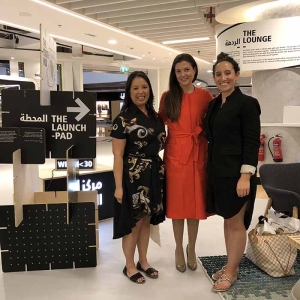The Mentor-Mentee Relationship: A Conversation with Annalisa Enrile and Alix Schwartz
February 08, 2018- Students
Mentorship is an essential and invaluable part of the student-teacher relationship — just ask this dynamic duo.
For many graduate students, a mentor can be a godsend, providing advice and experience to help guide them through their studies and toward an enriching career. Alix Schwartz, a second-year student pursuing a Master of Social Work in the department of Social Change and Innovation at the USC Suzanne Dworak-Peck School of Social Work, can attest: her relationship with Clinical Associate Professor Annalisa Enrile has opened countless doors.
Though they come from different backgrounds — Schwartz specializes in positive psychology, while Enrile has focused on issues of social justice such as sex trafficking, anti-militarization and exploitative migrant labor — they’ve found common ground in their mentor-mentee relationship and research interests; so much so that they recently traveled together to Dubai to attend the Women’s Economic Empowerment Global Summit.
USC Suzanne Dworak-Peck School of Social Work: How did you two initially establish a mentor-mentee relationship, and how has it grown over time?
Alix Schwartz: Our mentor-mentee relationship first developed when I took Dr. Enrile’s class on design and innovation. Dr. Enrile was looking for students to work on a project that she was innovating with a construction software company. I came on board and saw an opportunity to implement her work on positive organizational culture into the ideation and design of the project. Since then, our relationship has flourished, and we’ve continued to work on projects that enhance social good.
Annalisa Enrile: A lot of people don’t understand that building a strong mentoring relationship is a two-way street. As a mentor, you have something to teach, but you also have things to learn from your mentees. This is especially important in social work because the period of time spent together is relatively short (most programs are just two years). Without these mentor relationships, it can be very difficult to transition from being a student to being a colleague.
USC: Could you tell us a bit about how your trip to Dubai came about?
AS: With a background in positive psychology, I became interested in social work because I wanted to integrate the tools and skill sets of positive psychology to help rebuild quality of life within communities, populations and corporations. At the beginning of the semester, I mentioned that Dubai was working to become one of the happiest countries in the world. When Dr. Enrile told me about this conference, it seemed like a huge opportunity to continue our research, as well as get an in-depth understanding of their happiness initiatives and why they believe happiness is the precursor to their country’s success.
AE: Exactly. Our trip to Dubai was really two-fold. We were there both for the Women’s Economic Empowerment Global Summit, and to speak with one of Dubai’s governmental departments — the Knowledge and Human Development Authority, or KHDA — about its methods. The summit allowed us to build strong connections with construction and development companies that are owned and operated by women, while working with KHDA helped us better understand the role that innovation and positive psychology play in the work they’re doing.
USC: What sorts of happiness programs are in place in at KHDA?
AS: KHDA is responsible for the growth and quality of the private education sector in Dubai. They support schools, universities, parents, students and investors to create great programs, but they specifically focus on happiness, health and well-being as it relates to education. KHDA partners with the International Positive Education Network, or IPEN, an organization that I work with out of London, so we were able to get a meeting set up immediately.
What we saw at KHDA was completely amazing. For instance, there was a woman in the building whose job is to walk around and give people hugs, say prayers and spread words of kindness. That commitment to happiness extends to all the classrooms we observed as well, from coding to math.
The office is organized around a flat management structure, known as holocracy — a collaborative space where everyone works together. When you’re there, it makes you feel like you and everyone else deserves happiness.
USC: What were your biggest takeaways from the trip?
AS: Dr. Enrile is now mentoring me as I apply for PhD programs, which is a big step for me. One of my biggest professional goals is to write a book about women and mental health in the happiest and healthiest places in the world. This trip was really inspiring for both of us: after attending the women’s economic empowerment conference, we wanted to broaden the definition of empowerment, including what “happiness” for women looks like.
A mentor is a really special thing, and it’s rare to find someone who you truly connect with. The biggest thing that I’ve gained from my relationship with Dr. Enrile is the opportunity to explore my professional ambitions and grow in areas that had been stagnant. It’s an honor to have the opportunity to discuss my goals with someone who’s already spent her career fighting for the things that she’s most passionate about. She inspires me every day to push myself past fears and perceived limitations. Beyond that, we continue to learn about each other in the process, which has been even more valuable in deepening our mentor-mentee relationship.
To reference the work of our faculty online, we ask that you directly quote their work where possible and attribute it to "FACULTY NAME, a professor in the USC Suzanne Dworak-Peck School of Social Work” (LINK: https://dworakpeck.usc.edu)
